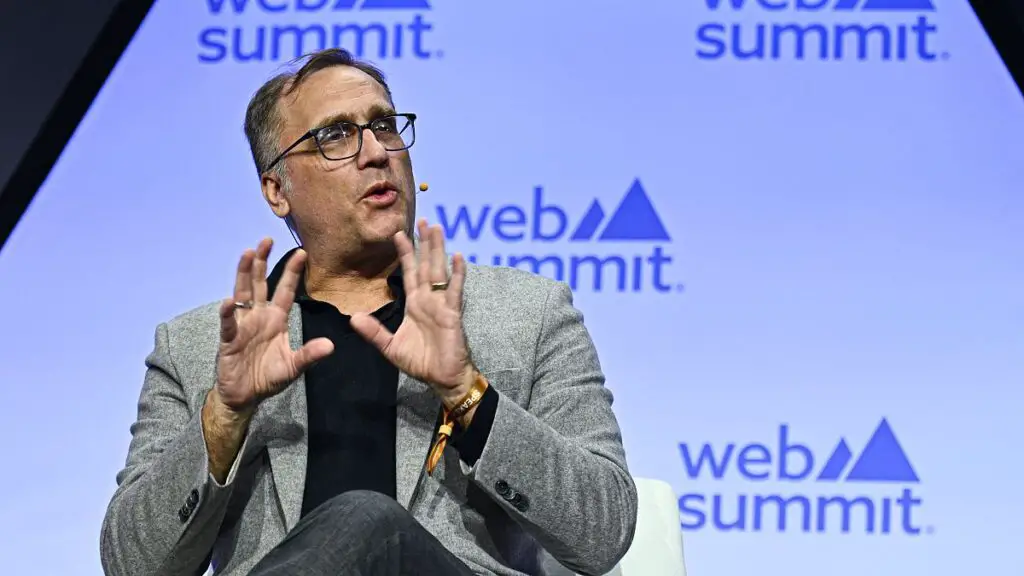As some firms scale back work-from-home policies, others continue to promote flexible set-ups. Mark Frein, chief operating officer at Oyster, talks to Euronews about remote working – and the benefits of hiring diverse talent.
While an increasing number of companies are scaling down options to work remotely, the pandemic has irreversibly altered the way that we work.
According to a report by Flex Index, full-time office mandates remain uncommon, with 67% of US companies still offering flexible work.
Mark Frein, chief operating officer at Oyster, spoke to Euronews at Web Summit, Lisbon, about the importance of remote work for diverse hiring.
Oyster, founded in 2020, works with companies around the world to help them hire across borders, navigating legal and logistical hurdles.
These hurdles include variations in employment terms, taxation, and redundancy packages.
“If you open an office in that country and develop the whole infrastructure and legal status in the country, you can hire people directly,” said Frein.
“But most of our customers are companies that are smaller … and they don’t want to get into the complexity of opening an office like this. … So we are a company that helps someone, say a UK founder who wants to grow their engineering workforce in Argentina, to do that without having to create an entity.”
Broadening the talent pool
By hiring workers across borders, firms can improve diversity on several fronts, potentially providing themselves with a competitive edge.
“If I’m only hiring in the place that I happen to have my corporate structure, I’m going to be limited by the local economy, the local talent pool, and the local demographics,” said Frein.
“If I’m going global…it opens up the talent market quite significantly.”
Creating a workforce that represents a range of nationalities, for instance, can provide a richer pool of ideas – with staff from different backgrounds offering fresh perspectives.
As well as cultivating international workforces, remote setups can boost diversity in terms of gender.
Studies show that flexible working policies can allow women to balance caring responsibilities with professional demands, which may previously have prompted them to drop out of the workforce.
These benefits, however, are also weighed against risks. Notably, women may be expected to respond to more family demands during work hours if they’re based in a home office.
Building a global workforce – but doing it well
Hiring across borders can also reduce labour costs, said Frein.
“If I tap out the talent market in my local community, it can get very hard to find people, which also means it can get very expensive… I’m competing with all sorts of different companies locally,” he explained.
Offshoring labour will nonetheless entail ethical considerations, linked to the fairness of local employment laws and wage requirements.
It’s standard to offer lower compensation if this is in line with market norms, although firms will want to factor living costs into salaries.
Safeguarding employee wellbeing is also about company culture, claimed Frein.
“If someone is on the other side of the planet and they don’t feel included in the company operations, that can definitely be a barrier for their employment experience,” he said.
To improve staff wellbeing, which has a direct effect on productivity, he argued that managers must be “intentional and diligent” about their available time to connect. “It’s a higher bar,” he added.
The future of diversity in the workplace
Frein noted that political backlash is pushing some companies to roll back policies on diversity, equity and inclusion (DEI).
Particularly in the US, firms like Ford, Jack Daniels, and Harley-Davidson have announced a scale-back of their targets.
This came as a response to conservative social media influencers threatening boycotts, although more U-turns may be influenced by the Trump presidency.
The Republican president, who won 50.2% of votes in the recent election, has referred to DEI policies as “unlawful discrimination under the guise of equity”.
If firms feel that this stance reflects public opinion, they may be more reluctant to champion diversity.
According to a survey from Pew Research Center earlier this year, 56% of employed US adults said focusing on increasing DEI at work was a good thing.
Some 28% responded ambivalently, while 16% said it was a bad strategy.
Acknowledging that political tensions are high in the US, Frein nonetheless claimed that diversity remains important to Oyster’s clients.
“What strikes me as really fundamental to the question is: how are people seen and heard at work?,” said Frein.
“We certainly still think very seriously about this question. And I know our customers do.”


